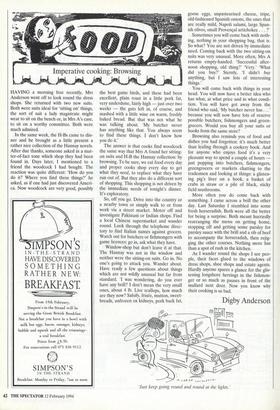Imperative cooking: Browsing
HAVING a morning free recently, Mrs Anderson went off to look round the dress shops. She returned with two new suits. Both were suits ideal for 'sitting on' things, the sort of suit a lady magistrate might wear to sit on the bench or, in Mrs A's case, to sit on a worthy committee. Both were much admired.
In the same week, the H-Bs came to din- ner and he brought as a little present a rather nice collection of the Hannay novels. After due thanks, someone asked in a mat- ter-of-fact tone which shop they had been found in. Days later, I mentioned to a friend the woodcock I had bought. The reaction was quite different: 'How do you do it? Where you find these things?' he asked, as if one had just discovered Ameri- ca. Now woodcock are very good, possibly the best game birds, and these had been excellent, plain roast in a little pork fat, very underdone, fairly high — just over two weeks — the guts left in, of course, and mashed with a little wine on warm, freshly baked bread. But that was not what he was talking about. 'My butcher never has anything like that. You always seem to find these things. I don't know how you do it.'
The answer is that cooks find woodcock the same way that Mrs A found her sitting- on suits and H-B the Hannay collection: by browsing. To be sure, we eat food every day and proper cooks shop every day to get what they need, to replace what they have run out of. But they also do a different sort of shopping. This shopping is not driven by the immediate needs of tonight's dinner. It's exploratory.
So, off you go. Drive into the country or a nearby town or simply walk to or from work via a street market. Motor off and investigate Pakistani or Indian shops. Find a local Chinese supermarket and wander round. Look through the telephone direc- tory to find Italian names against grocers. Watch out for butchers or fishmongers with game licences: go in, ask what they have.
Window-shop but don't leave it at that. The Hannay was not in the window and neither were the sitting-on suits. Go in. No one's going to attack you. Wander about. Have ready a few questions about things which are not wildly unusual but far from standard. 'I was wondering, do you ever have any brill? I don't mean the very small ones, about 4 lb. Live scallops, how much are they now? Salsify, frisee, mutton, sweet- breads, unfrozen ox kidneys, pork back fat, goose eggs, unpasteurised cheese, tripe, old-fashioned Spanish onions, the ones that are really mild, Napoli salami, large Span- ish olives, small Provençal artichokes . . . ?' Sometimes you will come back with noth- ing, nothing in your shopping bag, that is.
So what? You are not driven by immediate need. Coming back with the two sitting-on suits was very unusual. More often, Mrs A returns empty-handed. 'Successful after- noon shopping, old thing?' Very."What did you buy?' Sternly, 'I didn't buy anything, but I saw lots of interesting things.'
You will come back with things in your head. You will now have a better idea who has what, at what price and in what condi- tion. You will have got away from the friend who said, 'My butcher never has ... ' because you will now have lots of reserve possible butchers, fishmongers and green- grocers. Would you buy all your suits or books from the same store?
Browsing also reminds you of food and dishes you had forgotten: it's much better than leafing through a cookery book. And for anyone who enjoys food it's a very pleasant way to spend a couple of hours just popping into butchers, fishmongers, greengrocers or markets chatting to the tradesmen and looking at things: a glisten- ing pig's liver on a hook, a basket of crabs in straw or a pile of black, sticky field mushrooms.
More often you do come back with something. I came across a brill the other day. Last Saturday I stumbled into some fresh horseradish. Both were all the better for being a surprise. Both meant hurriedly rearranging the menu on getting home, stopping off and getting some parsley for parsley sauce with the brill and a rib of beef to accompany the horseradish, then rejig- ging the other courses. Nothing more fun than a spot of rush in the kitchen.
As I wander round the shops I see peo- ple, their faces glued to the windows of dress shops, shoe shops and estate agents. Hardly anyone spares a glance for the glis- tening longshore herrings in the fishmon- ger or so much as pauses in front of the mallard next door. Now you know why their cooking is so bad.
Digby Anderson
'Just keep going round and round at the lights.'


















































 Previous page
Previous page